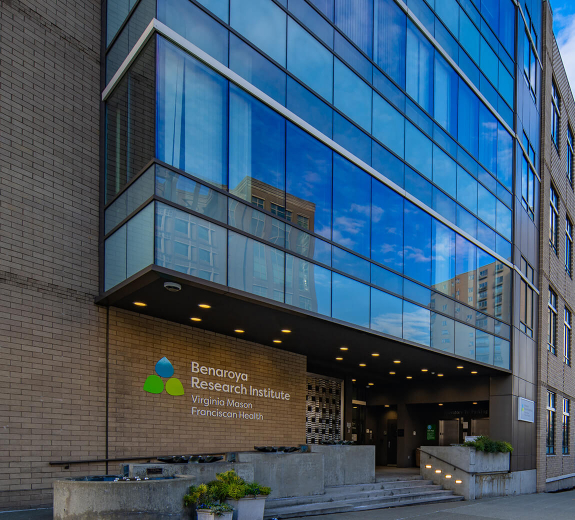Benaroya Research Institute (BRI) announced two research grants, totaling over half a million dollars, awarded in the first half of 2025. These grants support research that examines the underlying processes that lead to autoimmune diseases, like inflammatory bowel disease (IBD) and type 1 diabetes (T1D) in particular. Details of the grants include:
“Building Tools To Study Commensal-Specific CD8+ T Cells in the Small Intestine”
Oliver Harrison, DPhil
$ 173,300
The immune system, when working properly, protects people from pathogenic microbes. However, a symbiotic relationship with commensal microbes also exists that isn’t well understood. Immune responses to commensal microbes, including commensal-specific T cells, help support maintenance and repair of host tissues, including the skin and intestine. Yet, when these responses become dysregulated, they can contribute to multiple immune-mediated inflammatory diseases, including IBD. The overall goal of this grant is to better understand how commensal-specific T cell responses contribute to gut health through the development of novel mouse models. The insights garnered from this research will shed light on the symbiotic relationships between host and microbe in the gut and identify potential therapeutic interventions for diseases where this relationship is disrupted.
Sponsor: National Institutes of Health (R03AI190880-01)
“Understanding Disease Mechanisms Underlying Type 1 Diabetes”
Karen Cerosaletti, PhD
Eddie James, PhD
$ 471,909
The objective of this project is to determine if individuals with atypical T1D, characterized by the lack of existing autoimmune markers, have an autoimmune response to rare or unknown autoantigens, resulting in beta cell destruction. To date, individuals with atypical T1D have not been eligible for clinical trials because it is unclear whether they have an autoimmune etiology. Scientists and clinicians from BRI, as well as Baylor College of Medicine, University of California San Francisco, Seattle Children’s Research Institute, University of Chicago and University of Washington, have combined their expertise and samples to accomplish this goal. Using an innovative, unbiased method called PhIP-seq, serum from atypical T1D patients will be screened to identify novel autoantibody specificities compared to classic T1D and type 2 diabetes. The autoantibodies and their corresponding T cell responses identified from this method will then be used to identify biomarkers that accurately classify atypical T1D. Ultimately, the proposed study will help these individuals access better care and therapies to prevent or treat their diabetes.
Sponsor: Breakthrough T1D, subaward from Baylor College of Medicine
For more information about BRI, visit www.benaroyaresearch.org.



